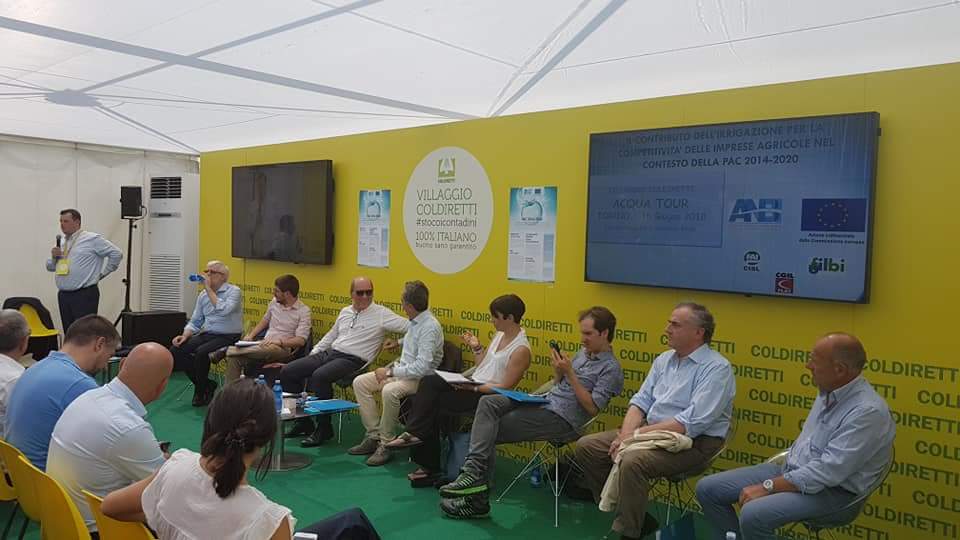16/06/2018
CAP 2014-2020: THE CONTRIBUTE OF IRRIGATED AGRICULTURE TO THE DEVELOPMENT OF RURAL AREAS, AGRI-FOOD ENTERPRISES AND THE SUSTAINABLE USE OF NATURAL RESOURCES
 "There is a flood of money allocated by the European Union that we risk having to return, because the opening of construction sites, whose projects are executive and final, is blocked by red tape. Given the technical time needed to complete the work and carry it out, there is a great danger that the 2023 deadline for reporting, as indicated by the Community bodies, will not be met. It is 300 million of euro, intended for interventions for irrigation and land use and then another 300, for the same objectives, but for which for months is expected the exit of the calls.
"There is a flood of money allocated by the European Union that we risk having to return, because the opening of construction sites, whose projects are executive and final, is blocked by red tape. Given the technical time needed to complete the work and carry it out, there is a great danger that the 2023 deadline for reporting, as indicated by the Community bodies, will not be met. It is 300 million of euro, intended for interventions for irrigation and land use and then another 300, for the same objectives, but for which for months is expected the exit of the calls.
The preoccupying alarm was sounded by Francesco Vincenzi, President of the National Association of Consortia for the Management and Protection of Land and Irrigated Waters (ANBI), who spoke in Turin at the conference "CAP 2014-2020: the contribute of irrigated agriculture to the development of rural areas, agri-food enterprises and the sustainable use of natural resources", an action co-financed by the European Commission within the framework of the "Water Tour 2018" organized jointly with the unions FLAI-CGIL, FAI CISL, FILBI-UIL.
"This year - continued the President of ANBI - the basins are full of water, but they represent the capacity to hold back only 11% of the fallen rains; it is clear the need for a National Plan Invasive, because 84% of that made in Italy agroalimentare depends on the availability of irrigation, which represents 40 billion of export, fundamental component of the 267 billion of total value of the agroalimentare production, where they find employment 3.300.000 people.
"It is necessary to invest in training and for the launch of the National Invasive Plan - echoed Sara Palazzoli, National Secretary of FLAI Cgil - Reclamation consortia represent the future of an economy that brings work through the promotion of resources such as water, land and food.
"There can be no development without investments for the territory and the agribusiness - insisted Gabriele De Gasperis, Secretary General of FILBI Uil - Then, however, resources are also needed to manage and maintain what has been achieved and land reclamation consortia, as well as the agricultural world, must be the terminals. For this reason ANBI and Professional Agricultural Organizations, together with the Trade Unions, must work together to share common proposals to be presented to policy to protect employment, work and the role of consortia. In this sense, a first important opportunity for discussion will be the renewal of the National Collective Bargaining Agreement for the Reclamation Industry.
 "Without the Consorzi di bonifica - added Stefano Faiotto, National Secretary of FAI-Cisl - there would not be much of the characteristic Italian landscape, nor excellences such as rice. These consortium bodies are the expression of agriculture and territory and they employ workers of extraordinary competence.
"Without the Consorzi di bonifica - added Stefano Faiotto, National Secretary of FAI-Cisl - there would not be much of the characteristic Italian landscape, nor excellences such as rice. These consortium bodies are the expression of agriculture and territory and they employ workers of extraordinary competence.
"Nothing should ever be taken for granted. For this reason - proposed Giorgio Ferrero, Piedmont Councillor for Agriculture - I propose that a document starts from this very region to reaffirm that economic development must be compatible with the conservation of natural resources, starting with water.
Also present at the Turin symposium were the Presidents of ANBI Piemonte, Vittorio Viora, and ANBI Valle d'Aosta, Giorgio Lale Murix, as well as Oliviero Alotto, Slow Food of Turin, who showed, in particular, the potential for "sweet" tourist use of the country's water network. "In cycling tourism - he exemplified - for 1 euro invested you get 70!
"Agro-food quality and hydrogeological protection contribute to that good territory, which is envied in the world; yet - added Massimo Gargano, General Manager of ANBI - there is still no national law against excessive land consumption where, instead, some Regions have already legislated autonomously. The objective of our commitment - concluded Gargano - is to contribute, through a new model of development, to bring the two Italies closer, making the gap between the North and South of the country shorter".
Related articles
- ANBI SCRIVE LA PROPRIA STRATEGIA VERSO LA NUOVA PAC E LA DIRETTIVA QUADRO ACQUE IN UN LIBRO, LA SFIDA SULLE RISORSE IDRICHE
- A CORDOBA, CONFRONTA EUROPEO SULLE PROSPETTIVE DELLA PPAC POST 2020
- SAVE THE DATE - FINAL PRESS CONFERENCE: BILANCIO ATTIVITA' PROGETTO PAC 2018/2019
- 11-19 MAGGIO: TORNA LA SETTIMANA NAZIONALE DELLA BONIFICA E DELL’IRRIGAZIONE
- DAL FONDO SVILUPPO E COESIONE, OPPORTUNITA’ PER IL MEZZOGIORNO CON PROGETTI SOSTENIBILI E CAPACI DI RILANCIARE L’ECONOMIA CON INFRASTRUTTURE FONDAMENTALI PER IL PAESE


